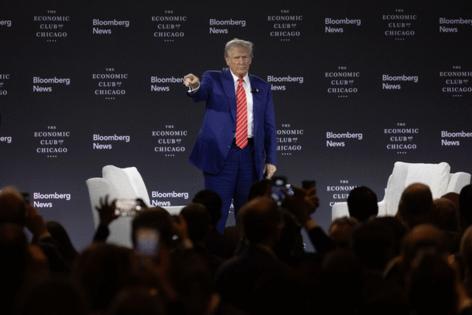Trump goes big on tariffs, floats business relocation penalty
Published in Political News
Former President Donald Trump doubled down on his plan to impose heavy tariffs on imports in a meandering interview at The Economic Club of Chicago on Tuesday, when asked about how he would pay for trillions of dollars in proposed tax cuts.
Trump proffered no other possible pay-fors for his tax proposals, which include extending expiring provisions from the 2017 tax law, lowering the corporate tax rate to 15 percent for domestic manufacturers and exempting tips and overtime wages from income tax.
“We’re going to bring the companies back,” Trump said when asked how he would cover the costs of his proposals. “We’re going to lower taxes still further for companies that are going to make their product in the USA. We’re going to protect those companies with strong tariffs, because I’m a believer in tariffs.”
The proposals, if enacted, could cost $10.2 trillion over 10 years, according to the Committee for a Responsible Federal Budget. The group’s estimate was released before Trump proposed a new tax break last week in Detroit: writing off the cost of interest payments on automobile loans. That plan could add somewhere between $61 billion and $173 billion to the debt, according to other estimates, depending on how it’s structured.
Trump has proposed a 10% across-the-board tariff on all imports and 60% on goods from China. During Tuesday’s remarks, he singled out imported cars for higher trade duties, saying he would slap a “100, 200 or 300” percent tariff on cars made in Mexico. He also floated imposing 50% tariffs on goods to force companies to relocate operations to the U.S. to avoid the penalty.
“First of all, 10% when you collect it is hundreds of billions of dollars … all reducing our deficit,” he said. “But really, so there’s two ways of looking at a tariff. You can do it as a money-making instrument, or you can do it as something to get the companies. Now, if you want the companies to come in, the tariff has to be a lot higher than 10% because 10% is not enough. Guys, they’re not going to do it for 10, but you make a 50% tariff, they’re going to come in.”
The CRFB estimated Trump’s tariff plans would raise $2.7 trillion, bringing down the net 10-year cost of Trump’s tax plans to $7.5 trillion.
A new forecast by the Tax Foundation, which typically favors free-market policies and tax cuts, found that Trump’s plans would cost $7.8 trillion over a decade before new tariffs offset $3.8 trillion of that. Another $921 billion would be saved by repealing green energy tax incentives, the group found, for a net cost of just over $3 trillion.
Trump’s tariff proposals would cost households on average about $2,600 a year, according to the Peterson Institute for International Economics.
The former president also reiterated his pledge to block the sale of U.S. Steel to Nippon Steel Corp., if the deal hasn’t closed by the time he takes office in January, should he win the election next month.
During the hourlong interview, Trump proved difficult to pin down on a number of other questions posed by Bloomberg Editor-in-Chief John Micklethwait.
Trump declined to commit to a peaceful transition of power come January and referred to the 2020 election as “crooked,” despite lack of evidence of fraud. He also refused to say whether he had been in contact with Russian President Vladamir Putin after leaving office, amid reports that he had.
“I don’t comment on that, but I will tell you that if I did, it’s a smart thing. If I’m friendly with people, if I have a relationship with people, that’s a good thing, not a bad thing,” Trump said.
Trump also refused to say whether he would remove Federal Reserve Chairman Jerome Powell from his position. Powell’s second term as chair is up in 2026.
Trump nominated Powell to the position, but openly criticized the chair during his presidency over interest rates, and now has chastised the central bank for lowering them ahead of the election. At the time, Trump’s comments were criticized as an attack on the independence of the Federal Reserve.
Trump said he should be able to weigh in on the Federal Reserve’s handling of interest rates, despite the central bank’s long-established independence when it comes to setting monetary policy.
“As a very good businessman and somebody that’s used a lot of sense…I think I have the right to put in comments as to whether or not interest rates should go up or down,” Trump said.
_____
©2024 CQ-Roll Call, Inc., All Rights Reserved. Visit cqrollcall.com. Distributed by Tribune Content Agency, LLC.




























































Comments